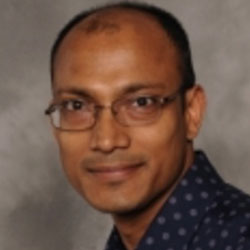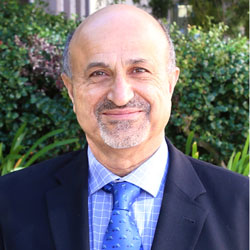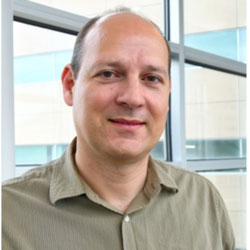
Dr. David Z. Pan
Professor
Electrical and Computer Engineering
University of Texas at Austin
Date and time: June 19, 2022, 9:45 a.m. Central Time
Title: Agile and Intelligent Design Automation for Digital/Analog/Mixed-Signal ICs
Summary: This talk will present some recent results and trends toward agile, intelligent and open-source design automation for digital/analog/mixed-signal ICs, in particular leveraging AI/machine learning with domain-specific customizations. I will first show how we leverage deep learning hardware and software to develop an open-source VLSI placement engine, DREAMPlace [DAC’19 and TCAD’21 Best Paper Awards], which is around 40x faster than the previous state-of-the-art academic global placer with high quality. DREAMPlace 2.0 and 3.0 have been further developed to tackle detailed placement acceleration and region constraints. I will then present the DARPA-funded project MAGICAL which leverages both machine and human intelligence to produce fully automated analog layout from netlists to GDSII, including automatic layout constraint generation, placement, and routing. MAGICAL 1.0 has been open-sourced, and validated with a silicon-proven 40nm 1GS/s ∆Σ ADC [CICC’21]. I will also discuss our new MAGICAL extension – OpenSAR for end-to-end SAR ADC compilation [ICCAD’21], and other research directions.
David Z. Pan is a Professor and Silicon Laboratories Endowed Chair at the Department of Electrical and Computer Engineering, The University of Texas at Austin. His research interests include bidirectional AI and IC interactions, electronic design automation, design for manufacturing, hardware security, and CAD for analog/mixed-signal ICs and emerging technologies. He has published over 420 refereed journal/conference papers and 8 US patents. He has served in many editorial boards and conference committees, including various leadership roles such as ICCAD 2019 General Chair, ASP-DAC 2017 TPC Chair, and ISPD 2008 General Chair. He has received many awards, including SRC Technical Excellence Award, 20 Best Paper Awards (from TCAD, DAC, ICCAD, DATE, ASP-DAC, ISPD, HOST, etc.), DAC Top 10 Author Award in Fifth Decade, ASP-DAC Frequently Cited Author Award, ACM/SIGDA Outstanding New Faculty Award, NSF CAREER Award, IBM Faculty Award (4 times), and many international CAD contest awards. He has graduated 40 PhD students and postdocs who have won many awards, including the First Place of ACM Student Research Competition Grand Finals (twice, in 2018 and 2021), ACM/SIGDA Student Research Competition Gold Medal (three times), ACM Outstanding PhD Dissertation in EDA Award (twice), EDAA Outstanding Dissertation Award (twice), etc. He is a Fellow of ACM, IEEE and SPIE.

Dr. Swarup Bhunia
Director of Warren B. Nelms Institute and Semmoto Endowed Professor of IoT
Electrical and Computer Engineering
University of Florida
Date and time: June 17, 2022, 9:45 a.m. Central Time
Title: Convergence of IoT and AI for Solving Global Problems
Summary: Internet of things (IoT) promises to usher in the fourth industrial revolution through an exponential growth of smart connected devices deployed in myriad application domains. It gives rise to new relationships between man and smart connected machines that enhance our everyday experiences. Convergence of IoT with artificial intelligence (AI) is transforming our industry through automation of manufacturing processes, industrial control, and maintenance/repair. They are also transforming our lives in all spheres – from transportation, healthcare, environmental monitoring, to education – due to a tectonic shift driven by the autonomous decision making capability of intelligent machines, accomplished through effective combination of sensing, connectivity, and learning.
Such a transformation, however, builds on innovations at all levels in the IoT architecture – from endpoint edge devices to the cloud. In this talk, we will cover the IoT design practices, core technological challenges that need to be addressed to enable wide-spread deployment of IoT, and opportunities for research/development. We will focus on innovations in the areas of energy-efficiency, security, interoperability and intelligent decision making. Next, we will discuss several compelling applications of IoT that gives unprecedented capability to us. In particular, we will cover applications of IoT in addressing some of the critical safety, security, and sustainability issues in our society leading to global prosperity.
Swarup Bhunia is currently a preeminence professor of cybersecurity and Steven Yatauro endowed faculty fellow of Computer Engineering at University of Florida, FL, USA. Prior to this, he was appointed as the T. and A. Schroeder associate professor of Electrical Engineering and Computer Science at Case Western Reserve University, Cleveland, OH, USA. He has over twenty years of research and development experience with 250+ publications in peer-reviewed journals and premier conferences and six authored/edited books. His research interests include hardware security and trust, adaptive nanocomputing and novel test methodologies. Dr. Bhunia received IBM Faculty Award (2013), National Science Foundation career development award (2011), Semiconductor Research Corporation Inventor Recognition Award (2009), and SRC technical excellence award (2005) as a team member, and several best paper awards/nominations. He is co-founding editor-in-chief of a Springer journal on hardware and systems security. He has been serving as an associate editor of IEEE Transactions on CAD, IEEE Transactions on Multi-Scale Computing Systems, ACM Journal of Emerging Technologies, and Journal of Low Power Electronics; served as guest editor of IEEE Design & Test of Computers (2010, 2013) and IEEE Journal on Emerging and Selected Topics in Circuits and Systems (2014). He has served as co-program chair of IEEE IMS3TW 2011, IEEE NANOARCH 2013, IEEE VDAT 2014, and IEEE HOST 2015, and in the program committee of several IEEE/ACM conferences. Dr. Bhunia received his PhD from Purdue University on energy-efficient and robust electronics.

Dr. Nader Bagherzadeh
Professor
Electrical Engineering and Computer Science
Professor (Joint Appointment)
Donald Bren School of Information and Computer Science
University of California, Irvine (UCI)
Date and time: June 17, 2022, 12:45 p.m. Central Time
Title: Machine Learning Computer Architecture Concepts
Summary: In this talk, an overview of current trends in machine learning computer design concepts will be discussed with an emphasize on challenges and opportunities facing this field. Some of the traditional computer design ideas that are now being applied to machine learning will be presented. Deep learning has emerged as one of the most promising research fields in artificial intelligence. The significant advancements that deep learning methods have brought about for large scale image classification tasks have generated a surge of excitement in applying the techniques to other problems in computer vision and more broadly into other disciplines of computer science. The phenomenal growth of machine learning is positioned to impact our lives in a way that we have not been able to fully imagine in the near future. This talk will also cover some of the key areas that AI has the potential to revolutionize.
Nader Bagherzadeh is a professor of computer engineering in the department of electrical engineering and computer science at the University of California, Irvine, where he served as a chair from 1998 to 2003. Dr. Bagherzadeh has been involved in research and development in the areas of computer architecture, reconfigurable computing, VLSI chip design, Network-on-Chip, 3D chips, machine learning accelerators, computer graphics, memory, and embedded systems, since he received a Ph.D. degree from the University of Texas at Austin in 1987. He is a Fellow of the IEEE.

Dr. Yiorgos Makris
Professor
ECE Department
The University of Texas at Dallas
Date and time: June 18, 2022, 9:45 a.m. Central Time
Title: Applications of Machine Learning in Hardware Security
Summary: Over the last fifteen years, hardware security and trust has evolved into a major new area of research at the intersection of semiconductor manufacturing, VLSI design and test, computer-aided design, architecture and system security. During the same period, machine learning has experienced a major revival in interest and has flourished from a nearly forgotten area to the talk of the town. In this presentation, we will first briefly review various machine learning-based solutions which have been developed to address a number of concerns in hardware security and trust, including hardware Trojan detection, counterfeit IC identification, provenance attestation, hardware-based malware detection, side-channel attacks, PUF modeling, etc. Then, we will examine the key attributes of these problems which make them amenable to machine learning-based solutions and we will discuss the potential and the fundamental limitations of such approaches. Lastly, we will ponder the role of and necessity for advanced contemporary machine learning methods in the context of hardware security and we will conclude with suggestions for avoiding common pitfalls when employing such methods.
Yiorgos Makris received the Diploma of Computer Engineering from the University of Patras, Greece, in 1995 and the M.S. and Ph.D. degrees in Computer Engineering from the University of California, San Diego, in 1998 and 2001, respectively. After spending a decade on the faculty of Yale University, he joined UT Dallas where he is now a Professor of Electrical and Computer Engineering, the Co-Founder and Site-PI of the NSF Industry University Cooperative Research Center on Hardware and Embedded System Security and Trust (NSF CHEST I/UCRC), as well as the Leader of the Safety, Security and Healthcare Thrust of the Texas Analog Center of Excellence (TxACE) and the Director of the Trusted and RELiable Architectures (TRELA) Research Laboratory. His research focuses on applications of machine learning and statistical analysis in the development of trusted and reliable integrated circuits and systems, with particular emphasis in the analog/RF domain. He serves as an Associate Editor of the IEEE Transactions on Computer-Aided Design of Integrated Circuits and Systems and has served as an Associate Editor for the IEEE Information Forensics and Security and the IEEE Design & Test of Computers Periodical, as a guest editor for the IEEE Transactions on Computers and the IEEE Transactions on Computer-Aided Design of Integrated Circuits and Systems. He also served as the 2016-2017 General Chair and the 2013-2014 Program Chair of the IEEE VLSI Test Symposium. He is a recipient of the 2006 Sheffield Distinguished Teaching Award, Best Paper Awards from the 2013 IEEE/ACM Design Automation and Test in Europe (DATE'13) conference and the 2015 IEEE VLSI Test Symposium (VTS'15), as well as Best Hardware Demonstration Awards from the 2016 and the 2018 IEEE Hardware-Oriented Security and Trust Symposia (HOST'16 and HOST'18) and a recipient of the 2020 Faculty Research Award from the Erik Jonsson School of Engineering and Computer Science at UT Dallas.
